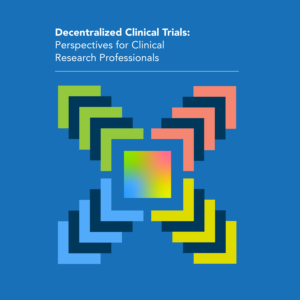A new white paper from the Association of Clinical Research Professionals (ACRP) assesses the significant implications of how decentralized clinical trials (DCTs) leverage digital technologies to interact remotely with trial participants. The paper, Decentralized Clinical Trials: Perspectives for Clinical Research Professionals, is authored by members of ACRP’s Fellows Advisory Panel who note that vastly increased DCT usage in the past two years has enabled clinical research to advance during the COVID-19 pandemic as part of a trend that is forecast to continue.
“This new publication brings a critical point of view to the discussion and debate occurring today about DCTs—the expertise of the professionals who are responsible for conducting decentralized studies,” says Susan Landis, ACRP Executive Director. “Clinical trial transformation depends on many things, most of all the expertise of clinical research professionals who conduct trials and studies day-in and day-out. These professionals’ experiences are essential to understand as they can help to identify and mitigate potential risks to subject safety, human rights, data integrity, electronic communication, and study financials.”
“The protection of study subject safety and collection of clean, unadulterated data are of the utmost importance during clinical trials,” says lead author of the position paper Jeri Burr, MS, RN, PED-BC, CCRC, FACRP, who is Executive Director of the Utah Trial Innovation Center in Salt Lake City. “The wide variety of DCT elements require ‘out-of-the-box’ thinking that challenges traditional processes and practices. In the position paper, we highlight the need to adapt to the range of models—and emphasize the need to train clinical research professionals to consider every study individually and customize study plans as needed.”
Additional authors of the position paper are Joy Jurnack, RN, FACRP and Jerry M. Stein, PhD, FACRP.
The authors note that potential benefits of DCTs include a reduced need for sponsor and study site resources, and a better, more convenient study subject experience with fewer, shorter clinic visits and less frequent face-to-face contact. Concerns related to DCT elements include the potential for missed opportunities to detect safety signals, increased data errors, and greater reliance on study subject compliance. The true balance of advantages and disadvantages using DCTs will become known during the next few years as collective experience increases.
Key recommendations of the position paper include:
- Sponsors, contract research organizations (CROs), vendors, and sites should review and potentially customize each study plan to account for decentralized elements.
- Clinical investigators should consider adapting site infrastructures to conduct studies that will likely require fewer patient site visits and increased remote data collection locations.
- Sponsors and CROs should consider modifying standard operating procedures and study-specific plans to train study subjects, provide access to study coordinators or coaches, and enable electronic communications.
- Clinical teams may need to expand to support digital communication and data collection, including electrical engineers, computer scientists, data engineers, or informatics specialists.
- Financial aspects of clinical research may need to be modified to reflect new activities, responsibilities, and data collection locations.
- Training curricula offered by ACRP (and other educational organizations) for clinical research professionals need to adapt to a wider range of new clinical operation models and roles.
The paper is part of ACRP’s mission to promote excellence in clinical research, and the vision that clinical research must be performed ethically, responsibly, and professionally everywhere in the world.
About ACRP Fellowship
Fellowship is a mark of distinction and leadership. ACRP recognizes individuals who have made substantial contributions to the Association and the clinical research industry. Fellowship will be suitable for only a select number of clinical research professionals who are recognized as global leaders.
Fellows are inducted annually at a ceremony during the ACRP annual conference and given the designation “FACRP.”
About ACRP Partners for Advancing the Clinical Research Workforce
ACRP’s Partners for Advancing the Clinical Research Workforce Program is a multi-stakeholder, collaborative initiative supported by more than 25 sponsors, CROs, investigator sites, academic institutions, and regulatory agencies to develop and advance a diverse, research-ready clinical research workforce in support of the life science industry and all organizations which support the development and delivery of medicines that work to improve population health. The program helps drive ACRP’s mission to promote worldwide excellence in clinical research.



